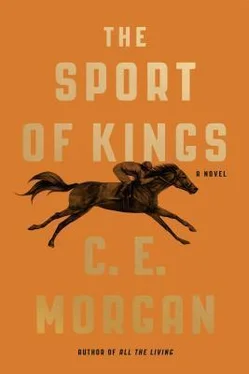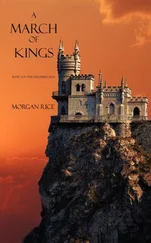He shook his head angrily.
“Grief?”
He nodded violently then, his neck straining, his eyes feeling wild like they didn’t know where to look. He tried once, tried again. “My momma, my life—” he choked out.
“What?”
“Died!”
Henrietta rose onto her elbow, her brow wrinkled. “Your mother died?”
He didn’t move for a moment, a wave of utter self-disgust wrenching his heart. Then he blurted, “Fuck!” like he’d made some awful mistake, and he spat a little when he said that, so he lowered his head in embarrassment, and then as if his bowed head were granting permission, he began to cry, first with a strange, strangled sound and then huge sobs. Henrietta was off the mattress in an instant like an animal taking flight; she grabbed at Allmon, half in alarm, half in affection, but that only made it worse.
He was losing control, the reins slipping his grasp. He was almost incoherent when he spoke through the tears that flooded his cheeks. “I don’t know … why you even want to be with me. They broke me. I’m fucked up. Prison fucks you up. I can’t tell you what I did … I’m broke.”
Her arms were around him like iron bands, but they didn’t feel like a constraint when she said, “I don’t think you see what I see.”
He couldn’t stop the horrible, stupid words as they began to run as furiously as the tears. “Why? I’m poor. I’m fucking ugly. They used to call me old-man Allmon. All anyone sees is black. I wish I was smarter … had money. I’m just average, you know.” He laughed bitterly and made a downward sweeping gesture toward his lap. “I didn’t get nothing good in this life. I didn’t get nothing that lasts. Prison killed me. You’re fucking a dead man.”
What Henrietta said next shocked her, because she once believed its very opposite, but she recognized the truth of it as soon as it was on her tongue. “It’s not the body I want; it’s the man. And that man is not dead.”
Allmon shook violently once as though he might cry forever, but then he stopped suddenly and laughed a rueful laugh of total humiliation, and was finally silent. When Henrietta heard that laugh, however minor the key, she scooted back onto the mattress on her back with her arms open. “Lie down with me,” she said.
Allmon looked toward her once, warily, wishing to escape. He was horrified to the marrow of his bones that he had cried in front of her.
“Come here,” she said again, and patted the mattress.
Gingerly, reluctantly, like he was testing broken bones that had only recently begun to knit, he rolled onto his side next to her. Everything hurt.
Henrietta placed her head next to his on the pillow, twined one leg over his, and held him fast until she felt certain he wasn’t going to roll away or get up.
“What’s the best thing you can think of?” she said.
He was surprised by the question but responded with surety. “The river.”
“The Ohio River?”
Allmon nodded, and in his exhaustion closed his bloodshot eyes to savor a private vision. “Because my momma … I know she’s on the other side. It’s like she’s alive and just waiting for me to come home.” His words drifted away. Quietly, he said, “What about you?”
“Me?”
“Yeah. What’s the best thing you can think of?”
Henrietta’s face, as always, was serious. “Don’t you know?”
“What?” He turned finally to look at her, quizzical.
“You,” she said. “You’re the best thing I can think of. I feel like the real me when I’m with you, and I’ve been waiting my whole life for that.”
* * *
He’s asleep, and she isn’t going to wake him. She’s leaving, but it’s impossible to return to the house, impossible ever to return to her old self. There’s a new spirit transplanted into the old, worn body. So, she wanders away across the grounds, which are her father’s, through a brand-new morning under a brand-new sun. Born out of his grief, which he planted in her with his words, she can feel ecstasy growing.
The truth? His nakedness — the nakedness of his heart — is her first happiness.
The world is busy rearranging its terrors and its joys, and something in her quickens. She’s aware of herself, perhaps for the first time, as constantly varying, no longer separate from nature, no longer the watcher.
She feels like a woman — or like more, like she herself is the spring, which once seemed like something outside of her: force and violence, charging the barren landscape and murdering winter, beholden to nothing — certainly no human or animal. Spring comes as a reconnoitering scout, a first slip of green peeking from the very bough tips of the oaks, barely there at all, just a weighted abeyance. Winter is damaged but still dreadful and full of poison ice and useless powder; every human heart senses that brief lull; it’s only a first flirtation, but they’re raw with expectation, impatient after the long revolution of the year. They let their stoves and hearths go cold. They turn their animals loose as a prayerful incantation. Then the air fills with a natural heat as if from many bodies crowding close. The birds trill early and through the night. The hours quicken in their clocks, then a late March blooms gulfstream heat, then the lead goose returns with its followers, and suddenly, the season emerges, an influx of green overlaying the old, dead architecture and breaking through fading, whitened scars. The green comes up and out, like a river that’s been running under everything, rising, swirling, and pressing out of every living thing in wet, ripe presence, so the gushing river is in everything and covering everything — in the vasculature, the buds, the bark, the veins, the teeth, the tendons, the marrow. Up and out and over. This green burns the human eye. She isn’t adornment; she doesn’t care what you think of her beauty. This isn’t a gift; it would burn you if you held it. She’s brilliance without intellect, mother without love, a lover with two differently colored eyes: comfort and disaster. She destroys animals in their birthing, she floods the world, makes youth hasten out of itself, ripens everything to rot, she makes the graves warm.
This and more: viburnum in the yards, pungent as an ovulating woman, pink labial pistils, the leaf bottom shaped like a heart; fresh sun knocking down every shadow; the overeager daffodils, early every time; infantry grasses storming animal blazes and human paths; the lilac buds of the redbuds; pendant racemes of black locust; sumac’s lip-red fruit; mosses on bleachy bones; mosses on the hunched river stones; mosses on man’s abandoned hunting huts; also the drone of carpenter bees; bobbing nine-pin tails of deer; red-hooded woodpecker alighting; all the small animal bodies bathing in the sweetgrass; the green foliage glazed with yellow; new life in the old ossuaries; there’s the frog in the muddy shallows, gripping a twig with one splayed hand and floating loose and easy in the shallow waters; tiny penile head of the turtle poked from the depths of the pond, auras of water rippling from his briefly borne movements; turkeys in their heavy, improbable flight; crickets; gnats; flies.
Everything comes from everything and nothing escapes commonality. I am building a house already built, you are bearing a child already born. Everything comes from everything: a single cell out of another single cell; the cherry tree blossoms from the boughs; the hunter’s aim from his arm; the rivers from tributaries from streams from falls from springs from wells; the Christ thorns out of the honey locust; a word from an ancient word, this book from many books; the tiny black bears out of their durable mothers tumbling from dark lairs; eightieth-generation wild crab abloom again and again and again; your hand out of your father’s; firstborn out of firstborn out of firstborn out of; the weeping willows and the heart leaf, the Carolina, the silky, the upland, the sandbar willows; every tart berry; our work, which disappears; our mothers’ whispers, which disappear; every Thoroughbred; every violet; every kindling twig, bone out of bone; also the heat light-borne, the pollen airborne, the rabbits soft and crickets all angles and the glossy snakes from their slithering, inexhaustible mothers, freshly terrible. When you die, you will contribute your bones like alms. More and more is the only law.
Читать дальше
Конец ознакомительного отрывка
Купить книгу












